President Putin on His Meeting with Trump: “The US Has Become More Pragmatic”. A Good Personal Relationship has been Established
News Conference Following the G20 Summit. President Vladimir Putin answers journalists’ questions
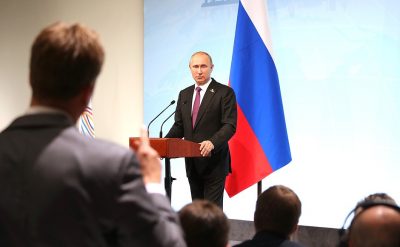
President of Russia Vladimir Putin: Good afternoon,
Allow me to skip any statements and monologues. You have seen and heard everything, a great deal. Let us get straight to questions.
Go ahead, please.
Question: Mr President, both experts and ordinary people, some of whom are rampaging near this building now, are known to have different opinions on the usefulness of G20 summits. At this summit, for example, there was more talk about your meeting with Mr Trump. And yet which of the issues discussed by the G20 is most relevant for Russia? Thank you.
We agreed on determining global economy sustainability principles, and this is vitally important for working along the same standards.
Then we continued with the issue which in fact had been launched in St Petersburg: money laundering and everything connected with tax havens and tax evasion. It is a crucial matter with practical implications.
Next, no less important and also connected with the economy, a related but very important issue – the fight against terror, tracking money flows to prevent the funding of terrorism.
Finally, a very big and very sensitive issue is climate change. I think in this respect the Federal Republic of Germany chairing the G20 has managed to reach the best compromise in a difficult situation the chairing nation has found itself in, namely due to the US quitting the Paris Climate Agreement. An agreement was reached, a compromise, when all the countries have recorded that the United States pulled out of the agreement but they are ready to continue cooperating in certain areas and with certain countries on addressing climate change challenges. I think this is a positive result in itself, which can be credited to Chancellor Merkel.
There are other issues we looked into. For example, digital economy. Here we proposed adopting common rules in the area of digital economy, defining cyber security and designing a comprehensive system of behaviour rules in this sphere.
We said today – the President of the South African Republic spoke very convincingly about it; in fact, this issue was touched upon in practically everyone’s speech and in some way it is reflected in the final documents – that we must be ready for the release of the labour force, we must make joint efforts, we must figure out what should be done with the workers who have lost their jobs, how to arrange retraining, what the deadlines are and what rules should be put in place.
Among other things I drew attention to the fact that trade unions will have to be engaged because they will protect not only the workers but also the self-employed individuals operating in the digital economy, and the number of such jobs is increasing. This is connected in one way or another with women’s rights and education for girls. This is being discussed at many forums but we talked about it today in the context of digital economy.
Overall, this forum is definitely effective, and I believe it will play a role in stabilising the global economy in general.
Question: Mr President, I would like to follow up on my colleague’s topic. Even though there were many political issues at the summit, they keep on surfacing at the G20 summits more and more often, yet you listed economic issues, which remain the priority anyway. Many speakers, ministers from different countries responsible for the economy, said that 2017 could become the year of global economic growth. How feasible is that and will this growth be seen in Russia in view of the current unfavourable trends – sanctions, restrictions and other factors?
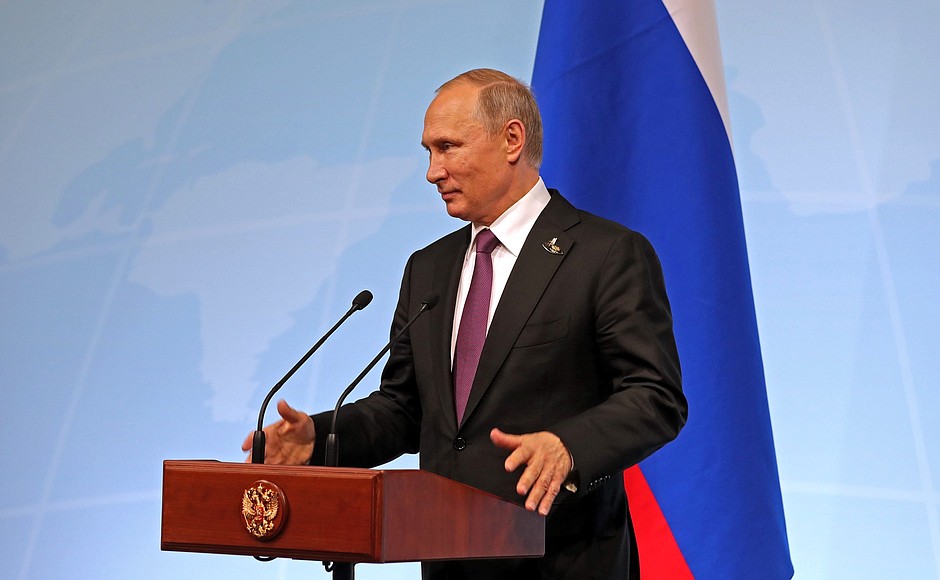
Vladimir Putin: We have not seen any unfavourable trends so far, or they have almost disappeared at any rate. Certain factors are having a negative impact on economic development, including in the global economy, the economy in the Euro zone and in Russia, those same illegitimate restrictions you have mentioned. We call for lifting any restrictions, for free trade, for working within the World Trade Organisation, in line the WTO rules. By the way, one of the topics discussed here was free trade and countering protectionism. This is also one of the crucial areas that should be mentioned.
On the whole, there is some progress. However, the initial optimistic growth forecasts have been downgraded. Nevertheless, there is growth, and it is apparent, including in Russia.
I said recently and repeated it here that Russian economic growth is tangible, the Russian economy, and we can say this with certainty, has recovered from the recession. We have been growing for the third quarter in a row, and soon it will be the fourth quarter in a row. Growth exceeded 3 percent in May: it was 3.1 percent. I think we will have an average of 2 percent in 2017. This is also a significant contribution to the global economic growth.
Let me remind you that we also have low unemployment of 5.2 percent, our reserves are growing, including the reserves of the Central Bank and the Government. The Central Bank reserves have already reached $412 billion. The federal budget revenues grew by 40 percent, and all this is happening against the background of fairly low inflation of 4.4 percent. All this taken together certainly gives us optimism; however, one cannot say with certainty that this is a long-term trend. We must take care to sustain this growth trend. I have every reason to believe that we will manage to do it.
Question: Mr President, your meeting with President Trump was literally the focus of everyone’s attention at the summit. How do you access the results of this meeting? It is no secret that US President had voiced a rather tough rhetoric in Poland, and there had even been unfriendly statements from US media in the run-up to the summit. Did Mr Trump ask you directly about Russia’s interference in the US [presidential] election? Did you like him personally? Do you think you will get along?
Vladimir Putin: The US President asked me this question directly, and we discussed it. And this was not a single question, there were many, and he gave much attention to this issue. Russia’s stance is well-known and I reiterated it. There is no reason to believe that Russia interfered in the US election process.
But what is important is that we have agreed that there should not be any uncertainty in this sphere, especially in the future. By the way, I mentioned at the latest summit session that this directly concerns cyberspace, web resources and so on.
The US President and I have agreed to establish a working group and make joint efforts to monitor security in the cyberspace, ensure full compliance with international laws in this area, and to prevent interference in countries’ internal affairs. Primarily this concerns Russia and the United States. We believe that if we succeed in organising this work – and I have no doubt that we will – there will be no more speculation over this matter.
As regards personal relations, I believe that they have been established. This is how I see it: Mr Trump’s television image is very different from the real person; he is a very down to earth and direct person, and he has an absolutely adequate attitude towards the person he is talking with; he analyses things pretty fast and answers the questions he is asked or new ones that arise in the course of the discussion. So I think that if we build our relations in the vein of our yesterday’s meeting, there are good reasons to believe that we will be able to revive, at least partially, the level of interaction that we need.
Question: To follow up on of your answer, could you please say if President Trump has accepted your denial of Russia’s involvement, Russia’s interference in the US election?
Vladimir Putin: I repeat, he asked many question on this matter. I answered all of his questions as far as I could. I think he took note and agreed. But it would be better if you asked him about what he thinks about it.
Question: One more question about the domestic policy, if I may. Actually, it is unrelated to the G20 but the question is about Russia’s domestic policy. I would like to ask what you think of Alexei Navalny and his activities. And why you do not say his name and surname when you answer questions about him.
Vladimir Putin: I think we can engage in dialogue, especially at the level of the President or the Government, with the people who propose a constructive agenda, even if they voice criticism. But if the point is to attract publicity, this does not encourage dialogue.
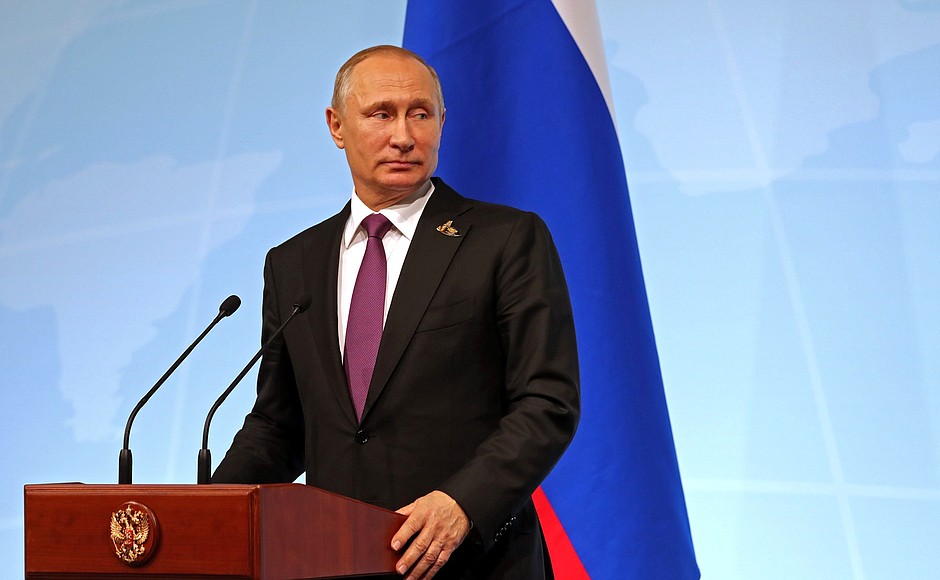
Question: Earlier this morning you had a meeting with the French President and the German Chancellor. I assume you had an in-depth discussion on the situation in Ukraine. Did a new vision emerge, and is there any hope that Donbass will come out of the ordeal gripping it right now? Can the discussion of the issue launched with the US President play its role, or do the interests of Russia and the United States still diverge in Ukraine, or may be even oppose each other in some matters? Which, by the way, can be presumed from the background of the US diplomat who was appointed special envoy.
Vladimir Putin: The interests of Russia and Ukraine, the interests of the Russian and Ukraine people – and I am fully and profoundly confident of this – coincide. Our interests fully coincide. The only thing that does not coincide is the interests of the current Ukrainian authorities and some of Ukraine’s political circles. If we are to be objective, of course, both Ukraine and Russia are interested in cooperating with each other, joining their competitive advantages and developing their economies just because we have inherited much from the Soviet era – I am speaking about cooperation, the unified infrastructure and the energy industry, transport, and so on.
But regrettably, today our Ukrainian colleagues believe this can be neglected. They have only one ”product“ left – Russophobia, and they are selling it successfully. Another thing they are selling is the policy of dividing Russia and Ukraine and pulling the two peoples and two nations apart. Some in the West like this; they believe that Russia and Ukraine must not be allowed to get closer in any areas. That is why the current Ukrainian authorities are making active and successful efforts to sell this ”product.“
But I think this will eventually come to an end. Russia, at any rate, wants for this situation to be over as soon as possible.
As regards the United States’ involvement in settling the situation in Ukraine, President Trump and I have talked about this and we agreed – and actually, this has already been done – that a special representative of the administration would be appointed to handle this issue on a permanent basis and to be in constant contact both with Russia and Ukraine, with all the parties interested in settling this conflict.
Question: Mr President, I have a question about the Middle East, which is seething at the moment: Syria, Qatar and other countries. You must have had discussions on Syria at the G20 Summit. How do you assess the prospects for the Syrian settlement after those discussions and after the recent meeting in Astana? Has the stance of the new US Administration on this issue changed or become more constructive, especially in view of yesterday’s agreements?
And also about Qatar, if I may. How do you assess the situation? Was it discussed at the G20 Summit?
And one more question, if I may…
Vladimir Putin: I will have to make a full report to you. (Laughter.)
Question: Well, one does not often get this chance. On the terrorism issue: as far as I know, agreeing on the Statement on Countering Terrorism was a difficult process. If it is not a secret, what were the major contradictions?
Vladimir Putin: To be honest, I am not aware of the difficulties, you had better ask the Sherpa. In my view, there were no basic objections from anyone. Maybe some of the wording. But, to be honest, I am not aware of that. I know that the text was agreed on. At any rate, at the level of delegation heads, heads of state, there were no problems or tensions. Everyone admits that this is a common threat and everyone states their readiness to fight this threat.
As for Qatar, the problem was not discussed. It is a fairly burning regional issue, and can impact certain processes, by the way, including in the economy, in the energy area and in terms of security in the region, but I did not discuss this issue with anybody during the Summit.
About Syria. Yes, we discussed this issue with almost all of my interlocutors. As for whether the US stance has changed or not – I would say it has become more pragmatic. It does not seem to have changed in general, but there is an understanding now that by combining efforts, we can achieve a lot. Yesterday’s deal on the southern de-escalation zone is clearly the result of this change. You know, others may react as they like, but I can tell you, this is one of the breakthroughs we have made in our work with President Trump. This is a real result of cooperation, including with the United States. Jordan has joined in the effort, and so have several other countries in the region. We have held consultations with Israel and will continue them in the near future. Still, this is a very good result, a breakthrough of a kind. Therefore, if we move the same way in other directions, towards other de-escalation areas…
We have discussed this very thoroughly with the President of Turkey today. This does not entirely depend on us, of course, as much has to do with the controversy between the countries in the region. Everyone has their own concerns, everyone has their own preferences, their own interests, I mean legitimate interests, so this is the way we must treat these – as their legitimate interests; we need to look for compromises.
You know, sometimes we find them. In any case, the fact that active military operations have ceased, the fact that we are now discussing de-escalation zones is a huge step forward.
Now we need to agree on the exact boundaries of these zones, and how security will be ensured there. This is a painstaking, even tedious effort, and it is extremely important and responsible work. Based on the recent positive experience, relying on the good will of Iran, Turkey, and of course, the Syrian Government and President al-Assad, we can take further steps.
The most important thing is – we have actually reaffirmed this, also in the documents establishing this zone in the south on the border with Jordan, and the area that borders on the Golan Heights – the most important thing is to ensure Syria’s territorial integrity, eventually, so that these de-escalation zones become the prototype of regions that could cooperate with each other and with the official Damascus. If we manage to do this, we will lay the groundwork, create the prerequisites for resolving the entire Syrian problem by political means.
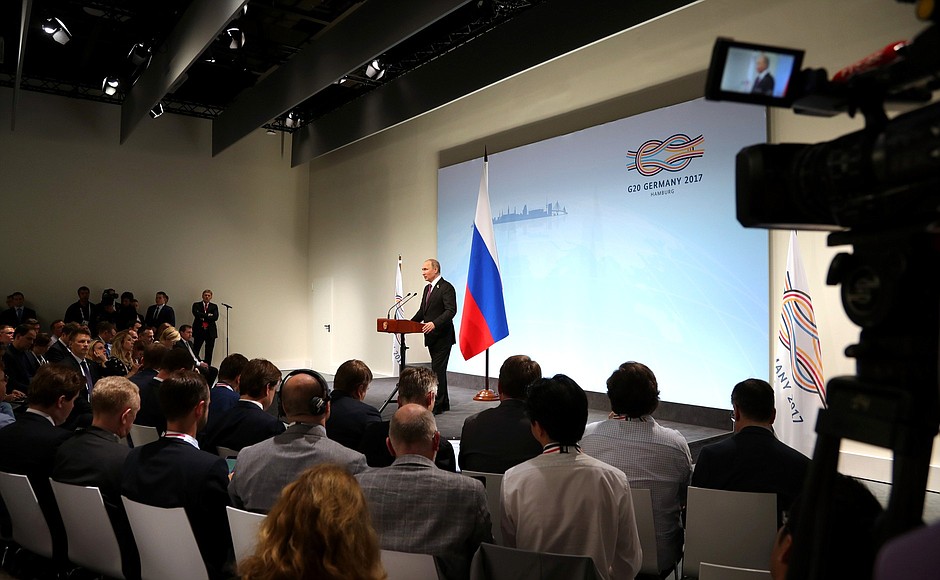
Question: We have already talked about interfering in the elections but we have new elections coming up in Germany.
Vladimir Putin: Here in Germany?
Question: These days we say “we have elections in Germany” in September. Is Russia planning to interfere in them? Did you notify Angela Merkel about how we are going to do it? Maybe you will give me a hunch as well? (Laughter in the audience.)
Vladimir Putin: You are asking rather provocative questions. But I told you that we had not interfered in the United States either. Why should we make trouble here as well? We have very good relations with the Federal Republic. It is our largest trade and economic partner in Europe country-wise, one of our leading trade partners in the world. We have large joint projects on the agenda that we support, for example, Nord Stream 2. There are a lot of tales being told about it, arguments and even resistance but it is absolutely evident that it is in the interests of the European economy and in the interests of the German economy, which wants to abandon nuclear power.
Why would we do it? Interfering in domestic political processes is the last thing we would wish to do.
If you look at the press, the German press or the European press in general, the French press, it is they who keep on interfering in our domestic affairs. But we are not concerned about it because we feel confident.
Question: Thank you very much, Mr President, for the opportunity to ask you a question on behalf of my television network. We meant to ask you about your meeting with President Trump, but my colleague has already asked the same question. And you said we should ask President Trump about what had happened.
Vladimir Putin: No, I did not. You should ask him about how he sees it, what he thinks about my answers. As to what happened – nothing happened, we did not interfere.
Remark: Unfortunately, the White House offers practically no information about what is going on.
Vladimir Putin: We will give them a piece of our minds. (Laughter.)
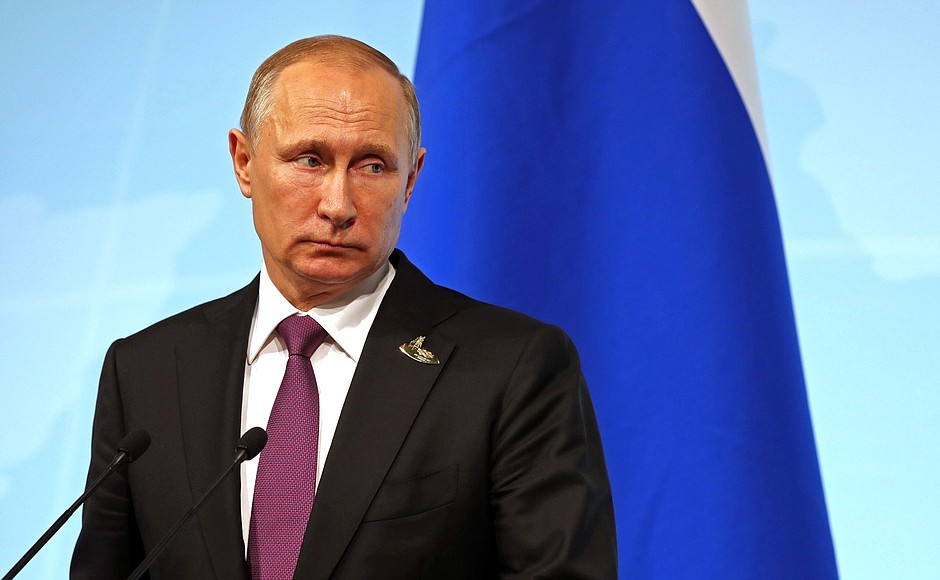
Remark: Could you just share what President Trump said during your meeting when you told him that Russia had not interfered in the political process?
Vladimir Putin: He started asking probing questions, he was really interested in some details. I gave him fairly detailed answers as much as I could. I told him about my dialogues with the previous administration, including with President Obama. But I do not feel that I have the right to give details of my conversations, say, with President Obama, it is not an accepted practice at this level. I think it would not be quite appropriate of me to give details of our conversation with President Trump. He asked me and I answered him. He asked probing questions, and I offered explanations. I think he was satisfied with those answers.
Remark: Thank you very much.
Vladimir Putin: You are welcome.
Question: Going back to the issue of boosting economic growth, to the measures that could be taken, the Government has already drafted a plan, and as far as we know, you have read it but for some reason the plan is classified. We know some parts of it from what you said about them.
Vladimir Putin: Let me explain. As you must know, we have several groups working on this issue: a group headed by Mr Titov with the involvement of the business community, and a group headed by Mr Kudrin, who has gathered a large number of respected experts. The Government is also working. But we should make a plan that will be acceptable, optimal for the next steps to be taken in the economy starting in 2018. And we must review all the proposals, assess them and in the end, make the final decision.
It may not be one of the proposals submitted; it may be something based on all three proposals. But work is currently underway, and we do not talk about it in advance.
But the Government has certainly done a great deal in this area, and we will rely largely on the Government’s proposals. We cannot ignore the results of Mr Kudrin’s work, and Mr Titov also has some sensible suggestions. This is why we are working at present to decide what the final variant will be out of the proposals for the development of the Russian economy from 2018 onward.
That is all. There are no secrets. What is the point? The point is that it is wrong to announce what has not been adopted yet. We could just send the wrong signals to the economy, and that is it. It all comes down to that.
Question: I have a question about domestic policy. I have learned that you have been briefed on the [limo] car of the Cortege project, which is to be used at the 2018 presidential inauguration.
Vladimir Putin: You seem to know this better than me: this is the first time I have heard about it.
Question: Have you thought of going for a drive in this car at the official event, that is, at the inauguration?
Vladimir Putin: No, I have not, because the car is not ready yet. You can go for a drive in it yourself, I will see how it goes, and later we can test it out together.
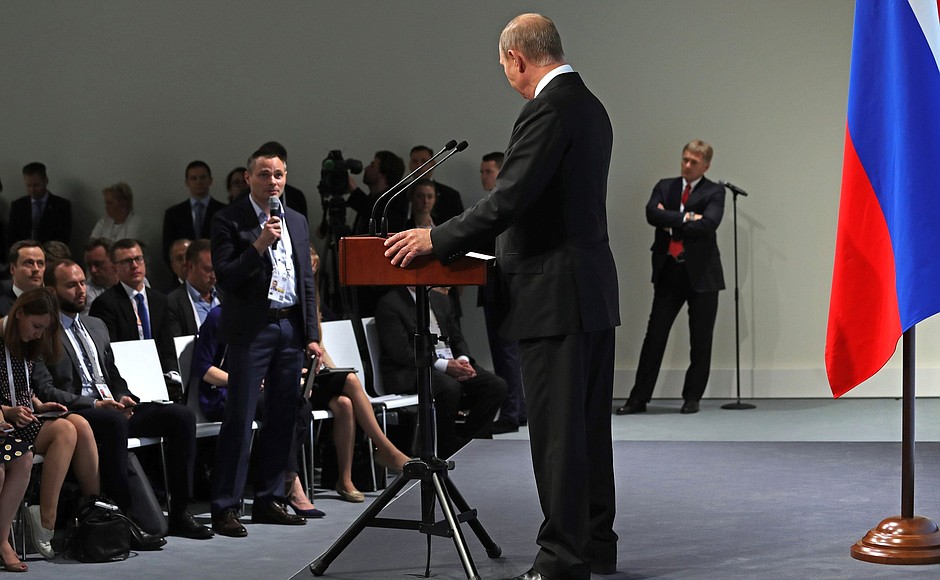
Question: You have spoken about the meeting with Mr Erdogan. Could you please elaborate – when you touched upon the issue of the first zone, the northern one, did you discuss the issue of the Kurds and particularly the territory of Afrin, where representatives of the Russian Centre for Reconciliation of Opposing Sides are present? The Turkish media are already preparing the ground for the Turkish army’s intervention to this area. Also, did you discuss the future of [Syrian President] Bashar al-Assad with Mr Trump and Mr Erdogan? For instance, Mr Tillerson said yesterday that this person has no future in the Syrian politics. He did not say how and when, but that was what he said.
Vladimir Putin: Let me answer the second question first. Mr Tillerson is a well-regarded man, he received the Russian Order of Friendship, and we feel great respect for him and we like him. But he is not a Syrian citizen, and the future of Syria and President al-Assad as a political figure has to be determined by the Syrian people.
As regards the Kurdish issue, this is a very big and complicated problem. We keep in contact with many Kurdish groups and make no secret of this. But with regard to military support of their activities, here our US colleagues are far ahead of the game; they are making much greater efforts in this regard.
Our servicemen – not advisers – who are monitoring the ceasefire are indeed present in many regions of Syria, where the truce agreement has been reached. But speaking of the regions you have mentioned, there are one or two of them there, they are not military units. They are performing the task that everyone is interested in fulfilling. But so far, we are not witnessing any preparations for military action; quite the opposite, we expect that our preliminary developments on establishing the de-escalation zones in several regions – in the Idlib area, in the north – will be accomplished. And this cannot be done without Turkey’s support.
Question: My colleagues here have already recalled the words President Trump said in Warsaw. He made yet another statement about the United States being ready to begin direct supplies of liquefied natural gas to Poland and Central Europe. What do you think of these plans, especially in the context of our plans for the Nord Stream? What if gas becomes a new cause of tension in US-Russian relations?
Vladimir Putin: I view these plans highly positively because healthy competition is good for everyone. We support an open market and healthy competition.
The US President said yesterday during the discussion that the United States stands for open, fair competition. And, by the way, when I spoke, I supported his point. So, we are absolutely all right with this; if it is so, if there is open and fair competition, no political motives or political resources involved, it would be quite acceptable for us. Because to date, it is an obvious fact that any specialist would tell you: the cost of production and delivery of liquefied natural gas from the United States is much higher than our LNG – even LNG – and is not even comparable to Russian pipeline gas. So, there is no doubt that we have an absolute competitive advantage. But to keep it, our market participants must work hard. They need to retain these competitive advantages.
Let us wrap this up. Go ahead, please.
Question: After the first meeting with President Trump, do you think it would be possible to gradually pull Russian-US relations out of deep crisis they are in, or is it difficult to say anything at all yet?
Vladimir Putin: I very much hope so, and it seems to me that we have built certain prerequisites for this.
Thank you very much. All the best.
All images in this article are from the original source.

